|
|
|
Sort Order |
|
|
|
Items / Page
|
|
|
|
|
|
|
| Srl | Item |
| 1 |
ID:
145595
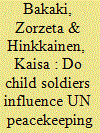

|
|
|
|
|
| Summary/Abstract |
The use of child soldiers in conflicts has received increasing academic attention in recent years. This article examines post-conflict periods to see whether the use of child soldiers mobilizes United Nations peacekeeping operations (UN PKO) in the aftermath of a conflict. Taking into consideration how child soldiers affect conflict and how important their reintegration is to sustainable peace and post-conflict development, we analyse whether the presence of child soldiers in a civil war increases the likelihood of the presence of a PKO. We argue that the UN deems a conflict with child soldiers as a difficult case for conflict resolution, necessitating a response from the international community. This is in line with our empirical results confirming that the use of child soldiers significantly increases the likelihood of peacekeeping.
|
|
|
|
|
|
|
|
|
|
|
|
|
|
|
|
| 2 |
ID:
120182
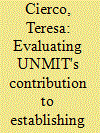

|
|
|
|
|
| Publication |
2013.
|
| Summary/Abstract |
Timor-Leste began the democratic transformation process in the beginning of this century with a heavy past legacy of external domination. Since then, it has been experiencing many difficulties in its path towards democracy especially in what concerns one critical issue: the respect for the rule of law. Focusing on two important pillars of the rule of law-justice and security-this paper seeks to understand why has been so difficult to establish the rule of law in Timor-Leste.
The article initially provides a generic picture of the rule of law as an important dimension of the United Nations peacekeeping operations. It also aims to outline the United Nations Integrated Mission in Timor-Leste (UNMIT) capacity in strengthening the processes of peacebuilding and reforms in Timor-Leste, as well as on ensuring the credibility and integrity of institutions, such as the courts and the national police, which are serious challengers to the country's future. It concludes by providing some thoughts that can help to determine whether Timor-Leste is ready to look after its own security after 2013.
|
|
|
|
|
|
|
|
|
|
|
|
|
|
|
|
| 3 |
ID:
190151
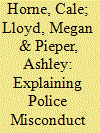

|
|
|
|
|
| Summary/Abstract |
Several recent studies consider the determinants of misconduct by military personnel deployed to United Nations peacekeeping operations (PKOs). While the majority of peacekeepers carry out their duties honorably and often at great personal risk, these studies operate from the premise that misconduct by even a few peacekeepers can undermine a mission, and reduce support for future missions. Even so, misconduct by civilian police deployed to PKOs remains massively understudied in comparison to their military counterparts, though UN police are more likely to face credible allegations of misconduct compared to UN troops. Based on the inclusive or extractive incentives of contributor states, we find support for the argument that the behavior of security personnel at home readily predicts misconduct when deployed to PKOs. This same logic has implications for the UN's increasingly preferred ‘Formed Police Units,’ whose use may actually increase the likelihood of sexual exploitation and abuse.
|
|
|
|
|
|
|
|
|
|
|
|
|
|
|
|
| 4 |
ID:
138981
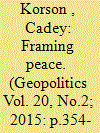

|
|
|
|
|
| Summary/Abstract |
Despite conducting sixty-six peacekeeping missions, the United Nations (UN) must repeatedly justify the necessity and wisdom of continuing these operations to the international community. Domestic success is contingent to a large degree on the willingness of citizens to cooperate with peacekeepers. Consequently, public perception in both the host country and abroad has become crucial to the continuation and maintenance of UN Peacekeeping Operations (UNPKO). A discourse analysis of domestic and international newspapers, radio transcripts, and television broadcasts about contemporaneous UNPKOs in Haiti and Côte d’Ivoire reveals staggering disparities. Diverging interpretations of mission mandates, violence, censorship, and colonial practices contribute to the way in which peacekeeping missions are perceived. This article identifies how current UNPKOs are perceived domestically and internationally and emphasises the role of these perceptions as a basis for evaluating and improving these operations.
|
|
|
|
|
|
|
|
|
|
|
|
|
|
|
|
| 5 |
ID:
142279
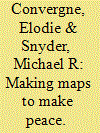

|
|
|
|
|
| Summary/Abstract |
This article analyses how United Nations peacekeeping operations are harnessing geospatial technology, including high-resolution satellite imagery and geographic information systems (GIS), in the furtherance of peace and security. We argue that it is strengthening the ability of peacekeepers to accomplish their mandated tasks, including the demarcation of international boundaries, support for the negotiation of peace agreements, stabilization, the protection of civilians, human rights monitoring, electoral assistance, support for the extension of state authority and the provision of humanitarian assistance. However, it remains to be seen how and to what extent UN peacekeeping can continue to grow and expand its geospatial capabilities. We identify several challenges of an operational and political nature that tend to impede its utilization. A key question in this regard is whether politics will prevent peacekeepers from exploiting recent advances in geospatial technology. We conclude and synthesize our argument by developing a simplified framework for determining when and under what conditions peacekeepers can effectively harness geospatial technology.
|
|
|
|
|
|
|
|
|
|
|
|
|
|
|
|
| 6 |
ID:
163381
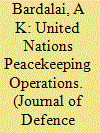

|
|
|
|
|
| Summary/Abstract |
Decades after the deployment of the first peacekeeping operation (PKO)—United Nations Truce Supervision Organization (UNTSO)—in 1948, the United Nations (UN) cannot boast of too many successes. The continued relevance of UN PKOs has thus come under criticism. In order to determine whether UN PKOs are still relevant, it is necessary to obtain a clear understanding of the reasons/factors for their success and failure, and thereafter assess their performance. Based on the author’s personal experience of peacekeeping and prior research, this article seeks to highlight a few factors that have an overriding influence on the outcome of a PKO. The article also attempts to provide a perspective on the relevance of the PKO in context of the challenges they face regarding planning, deployment and execution of such operations.
|
|
|
|
|
|
|
|
|
|
|
|
|
|
|
|
| 7 |
ID:
177857
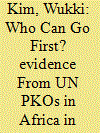

|
|
|
|
|
| Summary/Abstract |
The peacekeeping literature has primarily documented correlations between peacekeeping operations (PKOs) and their effectiveness or has focused on the decisions of troop-contributing countries participating in PKOs. Unlike the extant research, this paper shifts the focus to the decision-making process within PKOs. More specifically, this paper focuses on the timing of peacekeeper deployment by investigating how contributor leaders are distinguished from contributor followers. To tackle this topic, I use deployment-map data from 13 UN PKOs in Africa from 1990 to 2016. When a leader country deploys to a region before other countries, the followers will thus face an incentive to free ride because waiting to deploy to the region until it is secure is less risky. In short, there is a second-mover advantage that induces other countries to delay deployment until much later in a given UN PKO’s designated deployment window. This study finds that countries that could deploy more troops at their initial time of deployment and that have many previous UN PKO experiences are more likely to be leaders. Results also suggest that contributors engaging in multiple UN PKOs contemporaneously are less likely to be leaders.
|
|
|
|
|
|
|
|
|
|
|
|
|
|
|
|
|
|
|
|
|